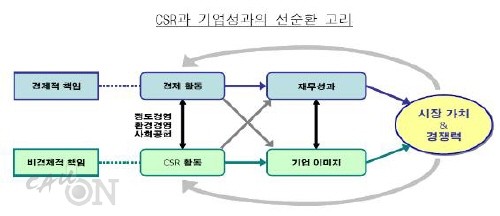
Have you ever seen the advertisement ‘Our Landscape is Greener and Greener’? This advertisement tells us that a forest is important to us, so we need to protect and take care of it. ‘Our Landscape is Greener and Greener’ is Yuhan-Kimberly’s campaign slogan. The reason why this advertisement has special meaning is that Yuhan-Kimberly is a paper manufacturing company. To make paper, it has to destroy many forests and consume many trees. In this situation, Yuhan-Kimberly’s CEO thought that destroying nature for the purpose of only earning profit is not the only duty of a business corporation. Therefore, Yuhan-Kimberly has carried out various activities related with the protection of forests over the last 24 years. These activities are referred to as ‘CSR (Corporate Social Responsibility).’
‘CSR’ means that the responsibilities of business corporations are to pursuit desirable policies in terms of society’s goals. Such responsibilities include not only economical but also legal responsibilities for society. It also implies that a business is to fulfill business operations with interdependent recognitions among people, organizations, societies and systems. In summary, ‘CSR’ is a normative system that focuses not only on profits but also on the demands of the masses.
‘CSR’ became noticeable during the 1920s US recession and its ‘welfare capitalism’. At that time, U.S.A business corporations were socially criticized, because they restricted free competition through business trusts or cartels. After the Great Depression passed in the 1930s, ‘CSR’ gained genuine importance in the 1950s. After the 1950s, management reflected its recognition of social responsibility and ethics.
In Korea, many people have been interested in ‘CSR’, since the mid-1980s. As plutocratic businesses were blamed for negative social influences, so academics and the press pressed for liable and mature business actions. Moreover, the best thing to rise out of ‘CSR’, which is one of the principal topics, is that change of fundamental awareness of businesses. The established thought among businesses is to just manufacture economical value and only concentrate on creating profits. However, this thought was the relic of an old era. In modern times, many people consider that businesses exist for various reasons that are of concerned people. These defenders regard businesses as not just stockholders’ possessions. They emphasize more active ‘CSR.’
‘CSR’ has become more and more important for the following reasons. First, ‘CSR’ is not a temporary fashion but a basic direction of social change. For example, Microsoft, HP, Coca-Cola and others about 4,000 business corporations altogether participate in the ‘Global Compact’ project as a CSR movement. In addition, W. C. Mitchell asserts that if businesses act as CSRs, government and customer acknowledge the justice of businesses pursuit of income. Furthermore, if businesses act well under a CSR program, it can gain image ascension from it and its product. It also brings an enlarging number of customers, contributes to promote social balance and creates a trusting community with each other.

However, CSR critics persist that the goal of businesses existence is growth and profit in a competitive society. Then, the enforcement to donate toward society could reduce enterpriser’s economical motives to start and maintain businesses. Although the social purposes could be achieved, economical effective value could be diminished owing to increasing social expenses. An effort to maximize could improve the world’s profit through competition. Last, public welfare is not a natural duty of businesses. They accentuate that businesses only provide goods and services effectively. However, the duty of a businessperson is to also contain and harmonize many groups and maintain their balance.
What is the present condition of ‘CSR’ in Korea? According to ‘The Federation of Korean Industries’, the domestic principal of 202 corporations’ CSR expenses last year were 1,804,800,000 won. It increased 28.7% compared with 2005. CSR expenses account for an average 0.3% of total sales. Among CSR expenses, cash donations decreased steadily to 56.7%, 79.0% in 2002, 68.0 % in 2004 and 64.3% in 2005. ‘The Federation of Korean Industries’ says that this tendency towards CSR has undergone change, so that businesses operate with a steady and systemic CSR program, which has replaced the one time cash donation. Most CSR expenses are used for social welfare, education, public schools, science learning, and cultural art. After 2004, CSR expenses have begun to also include medical sanitation, environment and international rescue.
Lately, we can easily find examples of ‘CSR’ around us. One of the ‘CSR’ programs is the ‘Mecenat’ program. ‘Mecenat’ means the contribution by a corporation through supporting the cultural arts. ‘Mecenat’ is also a French word commonly used for designating supporting activities of corporations towards cultural arts. ‘Mecenat’ includes patronage activities of corporations; not only supporting cultural arts, but it is also supporting ethics and morality to public utilities. There is a fundamental meaning behind the raising quality of a population’s life. By giving back a portion of a company’s profit margin to society through cultural art development, citizens can have many opportunities to appreciate a work of art and develop a social consciousness through ‘Mecenat’ principles.
There are some backgrounds of Mecenat revitalization. First, a period of ‘sale products only’ has gone. As the number of corporations increase, the position between corporations and customers has also changed. Now, corporations endeavor to attract and keep customers. Corporations want to differentiate themselves from other companies by using unique strategies of publicity. ‘Mecenat’ is one of those strategies. Moreover, the public has voiced its desire that corporations should share in social obligations, and it is getting louder. Corporations’ social obligations towards society have also created a large number of public benefits. ‘Mecenat’ not only practices business ethics as a social return of profits, but also raises cultural images. Besides, culture appears to have an effect on raising product quality and productivity.

Still, there is a skeptical vision in the case of Korea. ‘Are businesses a philanthropic organization?’ Although business expenses for CSR are about 1.4 trillion, citizens only gave business CSR programs a 37.4 point out of 100. Citizens should sincerely support and encourage their CSR work. CSR programs are not only a harmony between the fruits of businesses and society but also a foundation stone for sustainable growth. Now, businesses’ throwaway ideas which can solve irregularities and corruption through CSR. As corporations unify their business strategies and CSR, they should maximize synergy effects.
Now, CSR programs have become a proud wave, which cannot be ignored. According to businesses that prepare CSR programs, the future will be decided. Businesses are not only economical subjects to undertake producing and selling, but also an important factor of the nation. When will Korean businesses catch two rabbits, social responsibility and profit using proper strategies?

